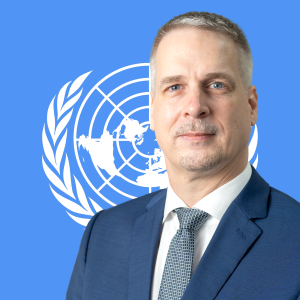Bula Vinaka, Namaste, Good Morning,
I am honored to speak on behalf of the UN Development Coordination Office and the UN Secretary-General. My thanks to UNEP and the UN Food Systems Coordination Hub for bringing us together.
We meet at a moment of both urgency and opportunity. Our food systems – and the ecosystems they rely on – are under extreme pressure.
The evidence is clear: while progress has been made, it is neither fast enough nor fair enough. The triple burden of malnutrition continues, while food systems themselves fuel greenhouse gas emissions, biodiversity loss, and pollution. At the same time, climate shocks and land degradation undermine food security.
In the Pacific, these challenges are felt directly. Droughts, floods, and cyclones can destroy entire harvests. Saltwater intrusion makes fertile soils unusable and rising sea levels threaten entire island countries with disappearance.
Disasters frequently disrupt supply chains between outer islands and markets.
And yet, the Pacific also demonstrates solutions. Communities blend traditional knowledge with modern science. Farmers adopt climate-resilient crops and varieties and soil-saving techniques. Fishers and women’s groups strengthen local value chains, keeping more nutrition and income within communities. These are not just coping strategies – they are signs of true transformation.
Going forward I would like to outline Three Pathways for Action:
-
1. Integration and Synergy:
We need whole-of-government approaches, so food system strategies reinforce environmental and social goals rather than work against them.
This means aligning food system pathways with the Paris Agreement (through NDCs and National Adaptation Plans) and with the Global Biodiversity Framework (through NBSAPs).
It also requires modern data systems and monitoring tools so that agriculture, health, environment, and finance ministries work from the same evidence base. Absence of shared and integrated data and monitoring ecosystems is a major impertinent.
However, in Fiji and across the Pacific, we already see such integration in climate, disaster, and biodiversity planning.
2. True Value Accounting:
Food is not just a commodity – it carries costs and benefits for people, ecosystems, and economies. Tools such as The Economics of Ecosystems and Biodiversity (TEEB) help governments account for soil health, water, biodiversity, and human health in decision-making.
This enables smarter policies, reduces harmful subsidies, attracts investment in sustainable practices, and cuts food loss and waste.
3. Engaging the Private Sector at Scale:
Transformation cannot happen without business and finance. Governments can set clear standards; concessional and blended finance can reduce risks for investors; transparency can reward those who invest in resilient soils, sustainable water use, and decent jobs along food value chains.
In the Pacific, governments, producers, women- and youth-led enterprises, and financiers are already building sustainable local markets.
The next step is scaling up, bundling small projects, aggregating demand, and aligning incentives to attract larger investment. The reliance on small donor-driven projects must be replaced with strategic programmes and initiatives that attract public and private investments that can be sustained and have an impact at the scale required.
People are at the Center of Food Systems:
-
Farmers and fishers.
-
Indigenous custodians of land and sea.
-
Women who balance nutrition, income, and care.
-
Young innovators applying climate-smart practices, digital tools, and circular business models.
Their leadership must shape the solutions.
Please allow me to present three Invitations to Action, based on the pathways for actions that I have outlined:
-
Align food-system pathways with National Climate Targets, Climate Change Adaptation Plan, and Biodiversity Frameworks, using shared monitoring and open data so decisions are joined-up.
-
Adopt true-value accounting to direct investment toward soil health, emissions reduction, biodiversity, and healthy diets – while cutting food loss and waste.
-
De-risk investments for scale by using concessional and blended finance to bring in private capital, bundle small projects, and create strategic pipelines that attract large-scale investors.
As the United Nations, our role is to convene, connect, and deliver – turning evidence into policy, policy into investments, and investments into results for people and planet.
Today’s session is designed exactly for that. You will hear concrete country examples and perspectives from health, environment, and the private sector, showing how transformation works in practice.
From the Pacific’s great ocean states, the Blue Pacific Continent, as you call it, to the vast diversity of Asia, we can make food systems a force for resilience, equity, and environmental stewardship.
The path is clear. Let us take it , together, and turn commitments into action this year.
Vinaka Vakalevu, Dhanyavaad, Thank You.









